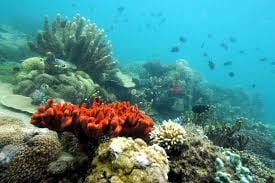The Extinction of Coral Reefs
By Lucy Barber
A coral reef is an underwater structure composed of the skeletons of marine invertebrates called coral which live off calcium carbonate exoskeletons. Currently, coral reefs occupy 0.1% of the ocean but the support 25% of marine species and surprisingly, also support a lot of the human population in various ways. However, unfortunately coral reefs are on the path to extinction. Right now, 50% of them have been destroyed and 40% are thought to be lost over the next 30 years, but why is this?
There are multiple reasons to why coral reefs are dying. Some include coral mining, unsustainable overfishing, pollution and ocean acidification. These all contribute to the extinction of coral reefs but like many environmental problems, global warming is the biggest threat. The increased temperature of the sea causes bleaching of the coral which reduces their growth rates and ability to reproduce.
Coral reefs bare more importance than many people realise. They protect the coast from storms and erosion by blocking a wave, so it loses its energy before reaching the shore. Coral reefs also provide many jobs to people such as tourist guides, fishing and any jobs associated with recreational activities that involve a coral reef. Furthermore, coral reefs are a good source of food, and medicine. Some medicines from coral include the anticancer agent Ara-C and the antiviral drugs Ara-A and AZT. In fact, over half a billion people depend on coral reefs for food, income and protection. Also, it’s not only people that need coral reefs for protection. Many marine animals use them for protection from predators and to lay their eggs.
So, what would happen if coral reefs were to go extinct? Considering their protection abilities, flooding would become more common and many small islands would probably be covered in water and removed from the map. Billions of sea life species would suffer without their home, protection and food source. The removal of coral reefs would cause 94 countries to take an economic hit because their tourism and fishing businesses would plummet. Lastly, lots of people could encounter a small food crisis due to the death of many fish and other sea creatures that were relied on for many people’s diets.
It is obvious that the extinction of coral reefs would be catastrophic, but luckily their are ways to stop, or slow down the process. One of the biggest factors is to reduce the impact of global warming by emitting less greenhouse gases into the atmosphere so sea temperatures don’t dramatically rise and cause bleaching of the coral. However, more methods more relevant to only coral reef conservation include the reduction of unsustainable offshore fishing or the reduction of tourism to coral reefs. Or alternatively, educational tourism that allows visitors to learn about the risks associated with the loss of coral reefs.
Coral reefs are a huge part of the world’s ecosystems and environment and the extinction would be fatal to the plant. In my opinion, more people should be making more of an effort to try and save our coral reefs.



